
How can digital tools impact your coaching?

Today, there doesn’t seem to be any aspect of our lives that isn’t addressed by a variety of digital tools. This goes for our coaching practices as well. In a series of posts, I wrote about Jennifer (post 1,post 2 ), one of my coaching mentees, who was hesitant about the “invasion” of digital tools into her coaching practice. Among her fears was that digital tools might actually take away some of her business, negative affecting her executive coaching rates.
My take on digital tools is that we should embrace them. Once we decide that they aren’t a threat but a friend, we’ll be open to seeing how they can benefit the three main stakeholders of most coaching relationships: the coaches, the clients, and the companies sponsoring the clients.
For our coaching practices, digital tools help coaches like Jennifer Doyle Vancil, M.Ed., owner of Communicating Strengths, LLC “stay in strong communication with her clients, share files, and give tasks to complete between meetings,” facilitating the coach and client to “reach specific goals.” For my own coaching practice, these capabilities are important for my “anytime, anywhere” coaching philosophy, where clients should be able to access the coach’s knowledge when it is convenient for them. With digital tools, the coach’s knowledge is there for the taking, without the coach having to email documents, hold impromptu phone consultations, etc, in effect also diluting executive coaching rates. This allows, in the words of Kirsten Meneghello, JD, PCC, owner of Illumination Coaching, to “deepen her relationships with corporate clients,” often leading to “repeat business.”
On the client side, Kirsten Meneghello points out how using digital tools allows clients to “get real-time feedback about what they are doing well and what behavior they need to modify.” In this way, they can keep track of their achievements and naturally “feel more successful as a result.” Digital tools can also facilitate self-directed development. Jennifer Doyle Vencil, notes that not only do her clients “embrace” such tools but also “give themselves tasks,” which she can monitor through their posts of “notes, research, and tasks,” allowing her to “know the progress they are making.” Having such a feedback loop that extends beyond the confines of the weekly meeting can boost the coaching process significantly. This type of 24/7 growth is possible only with the help of effective digital tools.
Company sponsors benefit greatly from digital tools as well. Companies spend significant budgets on coaching and until recently, might have found it difficult to track the progress of every manager. According to Kirsten Meneghello, digital tools can help companies gauge and assess their managers’ coaching processes, as they “can show metrics about the leader's improvement and that the coaching investment is making an impact.” This informs management of the ROI that specific coaching programs yield.
Another thought I’d like coaches to consider is the image of our profession. Competently and confidently using digital tools sends a message to our corporate sponsors and managers that our profession is up-to-date. Remember that those we serve have most likely embraced digital tools in their own industries and in turn expect us to do the same. Digital tools are equated with well-run businesses. We owe it to our corporate sponsors and managers to ensure we are using everything at our disposal to provide the highest level of service possible.
As a final note, I hope that if there are any other coaches who are hesitant about integrating digital tools into your practice, then the insights provided by the highly competent professionals in this article have encouraged you to explore how digital tools can help your practice, your clients, and your corporate sponsors.
I’d like to thank the generous and professional voices from the field that helped inform this article.
And always remember:
Great managers are made. Not born.
get your weekly free blog update
2 Steps to Sticking to Your New Year's Resolutions

The New Year’s festivities have come and gone and many of us have returned to work with renewed excitement and optimism for the new year - great for getting started on those New Year’s Resolutions.
But it’ll take more than just good vibes to keep you going throughout the year. One way of knowing how to measure success at work and towards your next promotion is through one magic word: STEP
Of course by STEP, I mean step-by-step. Consider which of these scenarios will work out for the long term:
1. You decide to go running every morning, so you wake up the next morning and begin your new daily routine.
2. You decide to go running every morning, so as a first step, you begin with twice a week, eventually increasing to three times a week and so on.
I don’t know which scenario you’ve chosen, but here are some really interesting numbers about a past experiment in which respondents were asked this question before they attempted to meet their long term goals.
On the whole, 60% of respondents chose scenario 1, while the other 40% chose scenario 2. This isn’t really surprising, as most of us approach new challenges imbued with optimism.
But here’s the really interesting part:
Of the respondents who chose scenario 1, less than 10% were able to meet their own goals, while of those who chose scenario 2, this number was over 90%. Talk about the power of outlook on achieving goals!
So let’s place our bets on the goal achievers (and not just the optimists) and meet your goals for the new year with STEP.
State your Goals.
This isn’t about your vision or general direction. This is about clearly expressing what you want - as specifically as possible. A good example might be: I want to be promoted to regional sales manager between September and November of the upcoming year. Fleshing out your goal in this way increases your commitment.
Talk your talk.
Once you’ve written out your goal, talk it out. Read it to yourself at least twice a day - treat it like your personal mantra. This will keep you waking up and going to bed with your goal, so that no matter what distracts you during the day, you’ll always come back to what’s most important.
Estimate the time to complete milestones.
Rome wasn’t built in a day and neither will your goals be accomplished in a day. When you stated your goals, you gave yourself an overall timeframe for completion. Now, you have to break up your goal into smaller milestones, estimating the amount of time it’ll take to meet them. An example of a milestone might be: I’ll hold a meeting with my immediate supervisor by the end of February. Estimating the time for completion will help you meet the milestones on the way to your ultimate goal.
Peg your progress.
Keep track of your progress, noting any gaps between what you’ve planned and what you’ve achieved - making any necessary adjustments along the way. By pegging your progress, you renew your commitment to your goal, ensuring its accomplishment.
So join the people who know how to achieve goals. Follow the STEP process in the new year and make your career dreams come true.
And always remember:
Great managers are made. Not born.
get your weekly free blog update
COMMENTS
Why do C-levels need coaching?

Ironically, many C-levels don’t even consider working with executive coaches. Sometimes, it seems as if executive coaching is dedicated to serving an audience who doesn’t recognize its value. There are a few reasons behind this. First, when it comes to professional development, senior managers will often put themselves at the end of the line.
According to Lacee Jacobs, PCC, ORSCC, Principal at The Coaching Salon, “even if they are coaching, the saboteurs of time, money, and more pressing priorities take a front seat and the coaching is put aside.”
Other than this perceived pressure, C-level executives often claim that their subordinates need coaching more than they do. Lacee Jacobs explains “the arrogance of having arrived due to their level”:
Being at the “top” becomes a metaphor for having already proven that they are smart, accomplished, and know what they are doing. This is a message to all that their work is complete when it comes to growth. I equate that to the “parent-child” mindset. It’s the parent that feels that if only someone will fix their child, life will be good. If it weren’t for the children screwing it all up, then there would be no problems.
In short, execs say they don’t have enough time and complain that they’re exhausted mentally. Yet they assert that they can go at it alone - and that any manager worth anything should be able to do the same.
But the data show us that going at things alone might not be the best course of action for C-level executives. Research conducted by Josette (Goldberg) Klopfer, MSMOB, PCC, EMCC-ESQA-certified Coach Supervisor, Founder and CEO of Goldberg Executive Coaching reveals that “according to a Harvard Business Review study, 2 out of 5 new CEOs fail in their first 18 months on the job.
Moreover, a Center for Creative Leadership study found that in the past two decades, 30% of Fortune 500 CEOs have lasted less than three years. Top executives’ failure rate is as high as 75% and rarely less than 30%.” This should be enough of a wake-up call for any C-level exec who thinks they don’t need coaching.
These failures could stem from the many unique challenges C-levels tend to face:
1. Rapid change
No one has to tell us that today’s business environment is running at a supersonic pace. According to Lisa Jackson of Corporate Culture Pros, “C-level execs are facing a world of unprecedented and rapid change. Digital transformation and employee expectations have forever altered competition, the war for talent, and strategy. There is no simple road map for success, based on the past.” As a result, C-levels might even find it difficult to consult with former C-levels, who have not had to rise to the same challenges.
2. Balance
A C-level’s life must support and maintain internal and external demands of different strengths. Jonathan Flaks of Jonathan Flaks Coaching Associates Inc. explains that “CEOs need to balance a demanding business life, intense external competition from other companies and endless demand for nurturing and leadership development from internal forces, while also maintaining a balanced personal life.” This, of course, can lead to what Kim Ades, president & founder of Frame of Mind Coaching, calls “slippage,” which is “allowing critical parts of their lives to slip through the cracks.” While “balance” and “slippage” need to be addressed at all levels, they both become increasingly difficult challenges as executives climb the corporate ladder.
3. Isolation
Surprisingly, CEOs seem to have less readily-available resources to support them in their role. As Anya Romanova, leadership coach at Anya Romanova Consulting puts it, “it is lonely at the top and there are no trainings on how to be a CEO…” This loneliness is often caused by a “double role” that CEOs seem to take upon themselves, as expressed in Lacee Jacob’s research: “As Kegan and Lahey shared, leaders are now performing two jobs. The job of protecting their status quo and what they don’t know and their real job.” C-levels need refuge from the mountain peak from time to time in order to remain at the top long term.
4. Insecurity
Just because a C-level has made it to the top, it doesn’t mean they’ve left their self-doubts behind. Lacee Jacobs explains her theory:
Having trained with Dr. Brene Brown, my theory on C-suite execs not wanting coaching would start with the link between shame and vulnerability. When it comes to a leader...the higher-up sometimes leads to the need for a greater cover-up. So often, leaders get themselves in a “pickle” when they are not willing to be humble and vulnerable and acknowledge their opportunities for growth and development.
Coaching can help take C-levels out of this “pickle,” which can lead to what Kim Ades (http://www.frameofmindcoaching.com/) has termed “chronic dissatisfaction” and to get them on track with an appropriate training and development program.
5. Expectations from the ranks
As with the democratization of news, rank-and-file employees expect to be “in the know” as much as possible, without which can lead to what Kim Ades deems as “strained relationships”. Anya Romanova explains: “The new generation of employees are millennials and generations below - they are looking for transparent leaders, purpose driven organizations and values based companies.”
Not only do C-levels need to disclose most of their moves, but also they no longer can hide their failures from the rest of the company. Lacee Jacobs, however, says that this could lead to serious issues: “Some of us put leaders on a pedestal and have huge expectations of them, which can make it more difficult for them to acknowledge that there is work to be done.
We need to do our part to support having imperfect and vulnerable leaders.” She adds, “The pain of exposing something that may reveal that after all the hard work they’ve done, what if there is something missing? What if where they are is not enough? What if others don’t appreciate the sacrifices they have made?”
It becomes obvious that coaching for C-levels is crucial for acknowledging, communicating, and working on imperfections.
6. Steep learning curve
Moving from middle management to the C-level often involves a much steeper learning curve than what was required in previous promotions. As Josette (Goldberg) Klopfer explains, “Making it to the senior executive level of Fortune 500 companies, or any big business isn’t for the weak of heart. Even when an executive has been a star performer, the final step up the ladder will be different.” But why is this final step so different?
In most cases, this is due to a change in focus from skills and proficiency to more strategic thinking. Lisa Jackson explains: “The skills and mindsets needed are beyond what most C-level execs have been trained to focus on - data, analysis, decision certainty.” Yvette Costa, CPC, ELI-MP, CYT and president of Full Circle Coaching concurs:
While it is likely that C-level execs got to where they are because they do have emotional intelligence, once they get to that level, their focus shifts squarely on the business. Making solid decisions, taking appropriate risks, focusing on the right things become front and center to their daily thinking.
As a result, Josette (Goldberg) Klopfer says, “To tap into the CEO’s highest performance as a leader, they must be 100% ready to ratchet beyond where they already are.” To do this, Lisa Jackson highlights the role of executive coaches, who “will help a C-level executive expand their understanding of the landscape of the future, versus what has worked in the past.”
The benefits of C-level executive coaching are numerous; here are three especially important ones:
1. Unbiased listening
Jonathan Flaks emphasizes that sometimes executive coaches are the only “unbiased listener” that a C-level will be able to consult with to have “those conversations you can't have with anyone else”, finally exposing what’s really happening. He observes: "You can't see the label from inside the bottle."
Along the same lines, Anya Romanova observes that “Most people don’t have the courage to give executives feedback (or the power dynamic does not allow it).” As a result, “A good coach will identify patterns and default behaviors to reveal blind spots.” I’ve always said that an executive coach is the only one who will help a manager look into the mirror.
2. Consciousness raising
Yvette Costa explains that an executive coach can help C-levels “increase their EQ, create goals/plans on how to use those skills” as “entering the AI era, EQ will be one of the essential skills needed by executives”. She also points out how coaches can help raise “awareness of how focusing on EQ will actually positively impact the business” in addition to “helping C-level execs become more conscious leaders at work and more conscious of how they interact with people outside of work as well.”
As I’ve seen in my own coaching practice over the years, the more a C-level coach is conscious of the changes they must make (as well as what they must give up to do so), the more successful they are at adapting to their new role. Costa concurs: “Too often C-level execs are simply acting on autopilot, reacting to situations based on habit and what has worked in the past.” The most difficult challenge for C-level execs is revisiting and decreasing what I call their “dominant” habits so that their innate potential can shine through.
3. Strategically thinking
The move to the C-level requires a paradigmatic shift towards strategy, which often can be a daunting move for the newly-minted C-level executive. As such, they need a partner to help them adopt a more strategic mindset.
As Josette (Goldberg) Klopfer explains:
An executive coach will work with a CEO in partnership and challenge the CEO to understand every aspect of their company, evaluate what makes them and their organization unique, and leverage the talents of each team member. Together the coach and CEO will build a plan that is realistically achievable based on the CEO’s unique personal strengths and leadership style.
Yvette Costa concurs in that coaches can help C-levels in “making solid decisions, taking appropriate risks, and focusing on the right things as the front and center to their daily thinking.”
According to Klopfer, the result of a successful coach-exec partnership is that “when employees see their leaders re-energized and armed with the fundamentals of leadership, teamwork, and personal effectiveness, the whole company and its bottom line grow.” This results in a “a cascading effect on the entire organization”.
You can lead a horse to water...
Naturally, some C-level execs are going to claim they have everything under control. After all, if they’ve gotten this far, why would anything stop them?
Jonathan Flaks reminds us that: If other CEOs like Eric Schmidt of Google are willing to confess that ‘You need a coach’ is the best advice he ever got, then I don't know any CEO who would be considered wise to go through the hero's journey we're talking about without a dedicated coach, or two, to ensure success and happiness the first time.
C-level execs would be wise to take up Schmidt’s advice as they plan their climb up the career ladder.
I’d like to thank the generous professional contributors to this article. Your candid voices from the field will certainly help nurture a new generation of C-level execs ready to face tomorrow’s challenges.
And always remember:
Great managers are made. Not born.
get your weekly free blog update
COMMENTS
Should executive coaches turn down clients?
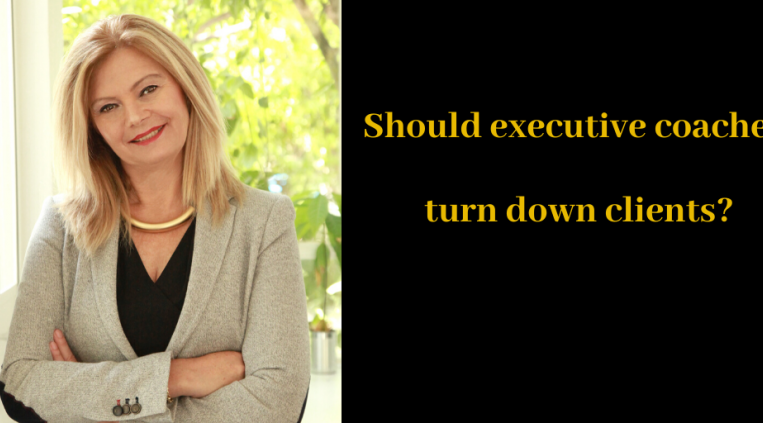
“What’s bothering you, Marlene?”
As I watched her playing around with her curry, I understood that my friend and coaching colleague wasn’t up to eating, even though we were having lunch at her favorite Indian restaurant.
“I think I have to turn down a client and I really feel guilty,” she answered as she continued to shift her curry from side to side. She hadn’t even touched her wine, either.
“So if you’re feeling so guilty, why not consider taking them on?” I probed.
“You know the story, Etika. We’ll have two or three sessions and then I’ll begin wishing I hadn’t accepted them, even at generous executive coaching rates” she answered.
“Then it actually looks like you’re smart for turning them down. So why is it bothering you so much?” I asked.
“Well, without getting into too much detail, this time it’s the CEO of a very high profile hi-tech company, with promising executive coaching rates.”
“Impressive!” I commented.
“Yes, but if I tell you about our first meeting, you’ll understand where I’m coming from,” Marlene said.
“I’m all ears.”
“Well,” Marlene began. “It started off with the way she spoke to me on the phone. Something in her very cold tone told me that I shouldn’t move things forward. But I did,” Marlene lamented. “I guess it was because she’s so high profile.”
“Fair enough. Been there. Done that,” I admitted.
“So, we set up a meeting at her office the next day. Without even a minute of small talk, she sat me down in front of her desk and complained to me that her team doesn’t get along with her,” Marlene recounted.
“Well, from the sound of how she spoke to you, I’m not that surprised,” I interjected.
“Indeed. But then she told me that the reason she wants to hire me is to force the team to cooperate with her!”
“Force? That’s a pretty strange way of doing things,” I said surprisingly.
“Wait, Etika, here’s the best part,” Marlene continued. “In the same breath, she asserted that she doesn’t see herself as part of the problem and that she won’t be involved in the coaching process.”
“Pretty low in the self-awareness department, I’d say,” I answered.
“And,” Marlene added. “At the end of the process, she wants a report of which employees I was able to change and who needs to be fired.”
“Is this person for real?” I asked flabbergasted.
“One hundred percent,” Marlene answered. “And she even tried to sweeten the deal by saying that if I succeed, I’ll have a lot more work at her company.”
“So you were tempted?” I asked.
“I don’t know if I was tempted or confused,” Marlene admitted. “I think that I wasn’t really sure how to respond, so I began asking her a few questions about her relationship with her team, what she expects, etc. All of it quickly confirmed my suspicion that she was just looking for someone to create an army of robots.”
“Sounds like an accurate diagnosis,” I commented.
“And so I pretty much instantly realized that this wasn’t the kind of coaching work I could or wanted to do,” Marlene concluded.
“I wholeheartedly concur,” I responded. “So why are you upset?”
“Well, the minute I realized this, I became overridden with guilt - professional, business, and even personal guilt,” Marlene said. “So I didn’t tell her ‘no’. In fact, our meeting ended with the CEO instructing her personal assistant to set up a series of meetings between the team members and me. But as I said, I don’t feel that I can go through with it. Yet the guilt is still there.”
“I get it, and I understand where you’re coming from, because, as I said, I’ve been there,” I answered. “So let me tell you a little bit about how I deal with occasional guilt.”
“Yes, Etika, please do,” Marlene urged.
“First off,” I began. “Whenever any guilty feelings begin to appear, I try to nip them in the bud.”
“Makes sense. But how?” Marlene asked.
“By always developing and maintaining my self-awareness, both as a professional and as a person,” I explained. “The better we know ourselves - what’s right for us, what’s not right for us, who we can help, and who we can’t, the better our lives will be.”
“I’m not sure I’m following you,” Marlene admitted.
“You see, Marlene, the sharper our awareness is, the easier it is to make the right choices, whether they are professional or personal. And when we’re sure our choices are the right ones, we don’t feel guilty about them,” I explained.
“So are you saying that you can just turn down a client and not think twice about it?” Marlene asked.
“You bet. In fact, I’ll even feel good about it,” I answered.
“Because you’ve made it very clear to yourself by staying in tune with your self-awareness,” Marlene interjected.
“Exactly,” I said.
“So I’ve got some serious work to do with my self-awareness,” Marlene concluded. “Etika, would you mind meeting with me a couple of times to mentor me on raising my self-awareness?”
“You don’t even need to ask,” I answered. “I was just going to suggest we meet next week for lunch. But this time, I want to see you enjoy your food!”
“You know, I’m already feeling better,” Marlene said. “And I have a suspicion that as soon as I call a certain CEO, my appetite will return.”
I raised my glass of wine and proposed a toast, “to not feeling guilty”.
And always remember:
Great managers are made. Not born.
get your weekly free blog update
COMMENTS
How a coach can help clients move from #2 to #1
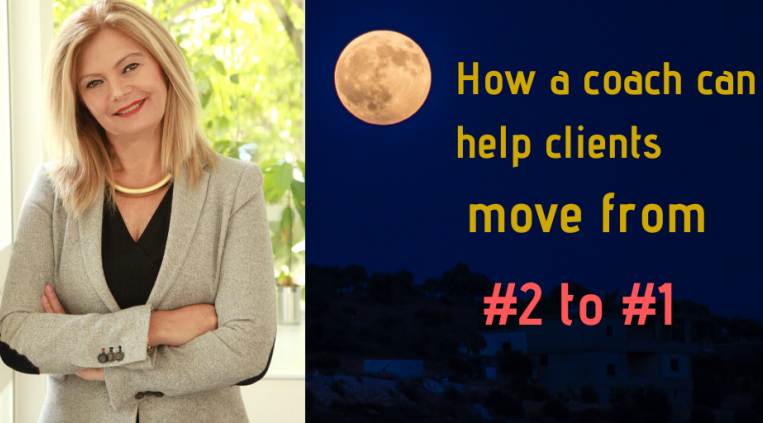
What seems to be the dream of every number two in an organization with regard to corporate development career path? To become number one, of course. But becoming number one is much farther than a hop, skip, and a jump.
Mark had spent the last eleven years in two different VP positions - always with one eye on his target: president, the natural pinnacle of a corporate development career path. And with the company’s recognition of his outstanding record, Mark was always sure that his target was well within reach.
But there’s recognition...and there’s recognition. Sure, Mark was constantly praised for his performance and results, but the proof of the pudding never came in the form of a promotion to president.
I met Mark one evening at my office. He quickly explained to me that seeing me was not his idea:
“It’s my wife, Kathy. She’s really been on my case the last couple of years. She can’t seem to get her head around the fact that I work until 8:00 pm most evenings, let alone Saturdays, and I still haven’t been promoted to president.”
I continued to listen.
“But to tell you honestly, Etika,” he admitted. “How can an executive coach really help me? No disrespect to you, of course, but I’m the only one that knows what’s happening at my company. I don’t think that any psychological theories will really be of any help.”
I invited Mark to sit down and he hesitantly followed my lead. He continued:
“Believe me, Etika, if you could help me get Kathy off my back, I would be grateful, but isn’t this a tall order for someone like you?”
“I like your candidness, Mark,” I answered. First let’s set some ground rules. You can say anything you want to me, even if you think it might be hurtful.”
“And guess what, Mark, I continued. “Maybe you’re right. Maybe I can’t help you. It’s happened before.”
Mark seemed slightly shocked by my response. After all, what kind of executive coach says they might not be able to help their client? But his face seemed to relax and he became more open.
“Look, Etika, I don’t have anything against executive coaches or other consultants. I even have some subordinates who’ve gotten a lot out of coaching sessions. I just think that it would be sort of mission impossible to help someone with my experience. How could you possibly know what I’m going through?”
“I respect what you’re saying,” I answered. “But let me ask you a question.”
“Sure,” Mark said.
“When a couple sees a therapist because they’re considering a divorce, do you think that in order for the therapist to treat the couple, the therapist needs to have personally experienced a divorce?” I asked.
Mark cracked a slight smile, showing me that he understood my point.
“You don’t have to answer, I can read your face,” I offered. “So Mark, if a therapist doesn’t have to have experienced divorce to treat a couple with marital issues, why do you think that an executive coach needs to have been a CEO?”
I continued, “Why don’t we think of these professionals as being competent in helping others navigate their own experiences, rather than as dispensers of marital or managerial advice?”
“Why is this so important?” Mark asked.
“Because I want you to really believe, Mark, that an executive coach can help you achieve your career aspirations,” I answered.
“Of course, you don’t have to be convinced right away,” I conceded. “But if you’re already here, I’d like for you to at least leave here with some insight as to why you aren’t open to getting any help.”
Mark smiled cooperatively. “Etika, as I told you before, I’ve been a heck of a VP the last eleven years. I honestly don’t think there’s anything that I can do to get myself promoted. It’s just not the right time now for the company.”
“I understand your point, Mark,” I answered. “But would you say that being number two is the same as being number one?”
“To tell you the truth,” Mark answered. “I used to think it was, but lately I’ve realized that the two positions are very similar in terms of day-to-day, but oceans apart when it comes to responsibility.”
I then asked, “Can you try to imagine situations in which number two does an excellent job but can never be number one?”
Mark responded, “Well, theoretically, yes, I suppose, but you’ve got to understand that this is not my situation.”
I smiled.
“Why are you smiling, Etika?” Mark asked.
“Because you really believe in what you’re saying,” I answered. “You see yourself as ready to be number one, yet eleven years have elapsed and you still aren’t there.”
“If you don’t mind, Mark,” I asked. “Let’s explore why you think that getting help from a coach won’t work.”
“Sure,” Mark responded. “First of all, no one else has my experience, so what could they possibly add?”
“And second, I know that I’m ready to be number one; it’s just a matter of the right timing.”
“And when I come to think of it, Etika, I came to you today because of these two points, but thanks to you, it’s really just the second one.”
“Glad I could be of help, Mark,” I offered.
“Can I ask you something, Etika?” Mark asked.
“Of course,” I responded.
“Judging from our conversation so far, do you think I need help?” Mark asked.
“Well, Mark,” I answered. “As I see it, that’s really not the important question here. What’s important is that we can only help people who think they need help - and are willing to receive it.”
“And regarding what you’ve expressed today, I’m sure everything is well-founded, as it’s based on your personal experiences and circumstances, so I really can’t argue with any of it.”
“But I’m not going to let you leave here empty-handed,” I said. “I’d like you to consider a few things.”
“I’m all ears,” Mark said.
“When someone is stuck in a certain way of thinking, on one hand, it’s good because it shows determination. But on the other hand, it prevents us from seeing the whole picture. We only see a slice of it.”
“Yes, I can see that,” Mark said.
“And regarding the question of the right timing, I agree with you, but then you’ve given up any control over your own fate. I would encourage you to look for something you can do, rather than just wait for the right time,” I advised.
“That is something to think about, Etika,” Mark said.
“And from my experience, Mark, success blinds us, and then we realize too late that we’ve missed out on some very important things, which are often important changes.”
“Wow, I’ve never thought of success as something that could be so dangerous,” Mark said.
I got up and shook Mark’s hand.
"Mark, I really enjoyed meeting you today. I hope you’ve left with something to think about for your future.”
“I certainly did, Etika,” Mark answered. He pulled out his phone. “Can we schedule our next meeting, let’s say, for Wednesday?”
“I’d love to work with you, Mark,” I answered. “But let’s give you some time to think about why you’ve changed your mind about executive coaching. When you’ve gathered some insight, give me a call and we’ll schedule our next meeting.”
“Will do,” Mark answered.
And always remember:
Great managers are made. Not born.
get your weekly free blog update
COMMENTS
How hybrid coaching can yield results for your clients
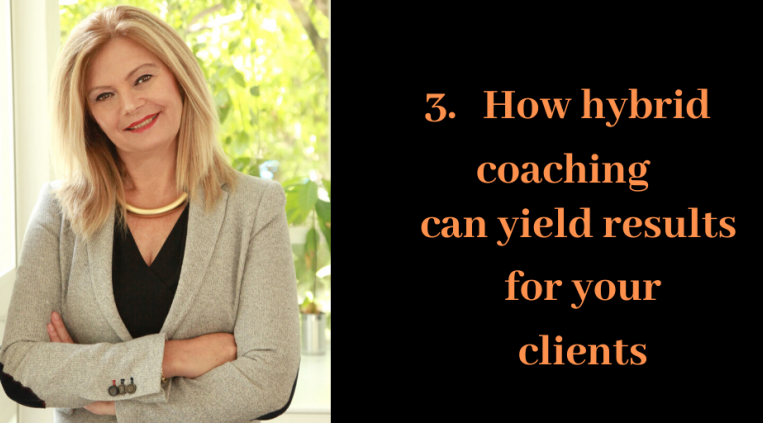
For those of you reading about my meetings with Jennifer for the first time, here’s a short recap: Jennifer is a successful executive coach whom I mentored for several years. Recently, one of her major clients replaced her workshop with a digital course, rattling Jennifer’s confidence and prospects about the future of face-to-face coaching, which she felt would ultimately affect her executive coaching rates. In the last two posts, Jennifer and Etika met at a coffee shop, where they began to explore the advantages digital tools can provide to their coaching practices.
After my last meeting with Jennifer, I received a notice about a digital learning fair taking place at the beginning of next month. Thinking that this would be a great opportunity to introduce Jennifer to digital learning tools, and hopefully allay her fear of reduced executive coaching rates, I forwarded the invitation to her and wrote her a note inviting her for coffee at the conference center at the end of the day.
After a truly stimulating fair, with all kinds of innovative digital tools being presented and demonstrated by dozens of firms, I sat down in the break area and waited for Jennifer.
“Etika!” she shouted. “There you are. What an amazing day! I can’t believe all of the awesome innovations I’ve seen today. So many ideas. Such brilliance.”
I smiled. “I’m so happy you enjoyed the fair today, Jennifer.” I gave her a hug.
“I’m blown away, Etika. Now I’m starting to understand what you’ve been getting at all along,” said Jennifer. “Etika, you told me at our last meeting that you’ve also been developing something, right?”
I answered, “Well, it’s actually all developed...and in use. But it took me over five years until I felt I’d gotten it right.”
“Five years?” Jennifer was amazed.
“And add to that the 35 years of experience and knowledge it’s based on,” Etika added. “But now it’s being successfully used by managers all over the world.”
Jennifer said, “Enough suspense, Etika. Tell me about it!”
“With pleasure,” I answered. “But first, do you remember what I said are the two main advantages of digital learning tools?”
“I certainly do,” Jennifer quickly responded. “I’m still a good student. The first is that because of the anytime/anywhere delivery, digital tools allow us to help many more clients, especially those who might be too busy for face-to-face coaching.”
“You really are a good student,” I said. “Go on.”
“And the second one,” she said, “Is that we can offer a wider range of solutions, therefore ensuring that clients receive customized service.”
“Bravo!” I congratulated. “Well, these two principles guided me in my development of the Executive Mirror Program.”
“The Executive Mirror Program?” Jennifer repeated. “Tell me more.”
“The Executive Mirror Program, or EMP for short.” I continued, “It’s an online course for managers who are stuck in their career. They feel as if they are never going to get promoted and have begun losing hope.”
“From my practice,” Jennifer said, “I’ve noticed that this is a huge niche and it keeps growing.”
“No doubt.” I explained, “It seems that with hypercompetitiveness, more managers are fighting for their careers than in the past. In fact, 70% of managers these days define themselves as stuck to some degree.”
“That’s a huge number, Etika,” Jennifer responded. “So there’s your first principle, helping as many managers as possible - wherever they are.”
“Bingo,” I answered. “With so many stuck managers, all of the face-to-face hours in the world wouldn’t be able to help them all. That’s why the self-paced online EMP is a perfect solution for them.”
“It certainly is. And what about your second principle, Etika,” asked Jennifer.
“You mean customized learning, I assume. Well, thanks to sophisticated algorithms, the EMP is actually dynamically tailored for each and every client. No cookie-cutter programs,” I proudly stated.
“So as a coach, you can actually provide a highly-customized solution to each of your clients,” Jennifer added.
“Yes,” I said. “Something that would’ve been impossible without digital tools.”
“But what about the personal touch, Etika?” Jennifer asked. “Aren’t there managers out there who still want to talk to a live coach.”
“Of course, Jennifer,” I agreed. “And that’s why the EMP can be seamlessly combined with face-to-face coaching. In the digital learning world, we call this hybrid coaching.”
“I see,” Jennifer answered. “A hybrid between online and face-to-face.”
“Indeed,” I said. “And that’s why I’ve developed a certification course for coaches who’d like to integrate the EMP into a hybrid coaching program.”
“That’s really forward-thinking, Etika,” Jennifer said. “So the EMP can also be used as part of a live coaching program.”
“That’s right. Maximum flexibility in delivering a tailored experience,” I said. “This is a major advantage that digital learning tools can offer us.”
I added, “And don’t forget, Jennifer. Our clients are already experiencing 24/7 learning online, whether it’s checking out a series of YouTubes on a subject or taking a full university course.”
“So you’re saying our clients will come to expect digital learning tools?” Jennifer asked.
“No doubt,” I answered. “And if we want to remain at the forefront of our field, as you’ve done so far, Jennifer, we’ve got to meet their expectations.”
“Etika, I think that I now really understand where you’re coming from,” Jennifer said. “It’s amazing that you had the foresight to predict all of this five years ago. I feel like such a dinosaur.”
“Nonsense, Jennifer,” I answered. “Like our clients, we avoid change, so sometimes we don’t let ourselves see what’s really happening around us.”
“Well, you’ve certainly opened my eyes, Etika,” Jennifer admitted.
“I’m glad, Jennifer. That’s what being your mentor has always been about,” I responded.
“So when do I get to check out your EMP, Etika,” Jennifer asked.
“Why don’t you come by my office tomorrow at 9, Jennifer,” I offered. “I’ll show you a full demo. I’m sure you’ll find it both innovative and fascinating.”
“I’m sure of that, Etika. Looking forward,” Jennifer said.
With that, we got up, hugged as usual, and left the conference center, both of us contemplating our bright future with the help of digital learning tools.
And always remember:
Great managers are made. Not born.
get your weekly free blog update
COMMENTS
How executives can benefit from online coaching tools
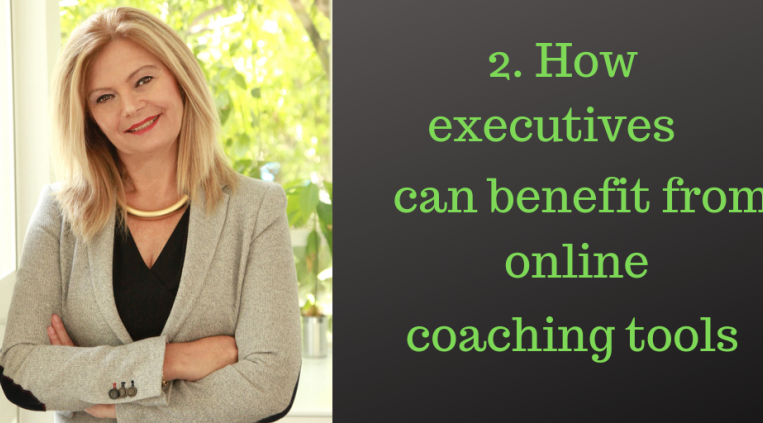
For those who haven’t had a chance to read my first post about Jennifer, I’ll recap: Jennifer, a star executive coach whom I supervised came to me one day very upset. She’d just found out that a company she ran leadership seminars for had “replaced” her with an online program, one of the new career advancement solutions.
Jennifer and I discussed this over a cup of coffee, in which I told her my point-of-view: Online coaching courses are a very big opportunity for coaches, as they’ll let us provide a larger number of career advancement solutions to a wider audience. This piqued Jennifer’s curiosity and we decided to meet again.
Yesterday afternoon, Jennifer walked into the coffee shop around the corner from my office with a smile on her face, a much different expression than the one she’d worn the last time we met. After a little bit of catching up and ordering our usual lattes, Jennifer began:
“Etika, I have to admit that I left our last meeting a little confused. I had come in so angry and hurt by my client but left with a glimmer of hope. It took me the whole weekend to really sort out how I feel, but I want you to know that I’m all ears regarding how you see online coaching tools as a vehicle to grow my practice.”
I smiled, as I was really pleased that Jennifer had taken on my advice, especially since I knew the potential that online tools could add to her already successful business.
“That’s what I like to hear,” I told Jennifer. “I’ve done a lot of research regarding online coaching tools and I want to share my main findings.”
Taking out a pen and notepad, Jennifer answered, “Ready when you are.”
“Great,” I answered.
“Here’s the headline: Online courses are not only going to increase in number but also develop in directions we’re not even aware of.”
“Got it,” Jennifer answered. “That sounds reasonable...like so many other technological developments.”
“It does,” I said, “But I want you to know how many coaches I’ve met who spend...no...waste valuable time discrediting online courses. What they don’t realize is that what they’re really doing is expressing fear.”
Jennifer nodded her head in agreement, but asserted, “Well, they are justified in being afraid. Look what happened to me!”
“Fair enough,” I said. “But categorically rejecting every online solution only because it’s online is ridiculous. Like everything, there are many different levels of quality.”
“I see what you’re, saying, Etika,” Jennifer said. “And it doesn’t put the coach in a very good light either, I suppose.”
“Precisely,” I said. “So rather than viewing online courses as the enemy and spending time putting them down, better to see how we can begin to accept them as real players in our industry.”
“OK,” Jennifer followed.
I continued, “Once we accept them as players, we can stop being afraid and start seeing the kinds of opportunities they’ll present to us.”
“Like what?” Jennifer asked.
“Well, the biggest one I’ve identified so far, Jennifer, is how online tools can help us, as coaches, provide the best solution possible for our clients.”
“Yes, I remember your saying something about this the last time we met,” recalled Jennifer.
“Good memory! Now, try to think about how many times your clients have cancelled or put off meetings because they said they didn’t have enough time.”
“Ugh. More than I’d like to think about. It always gets me so upset when I have to rejuggle my calendar,” Jennifer lamented.
“Tell me about it,” I said. “It always begins with a big apology and then spins into three or four emails until we finally figure out when to meet...not to mention the loss in income.”
“You said it,” agreed Jennifer.
I continued, “But think about these busy managers, always under pressure. You know as well as I do that they really don’t control their own schedules.”
Jennifer reflected, “Yes, it’s not really their fault, is it.”
“That’s right. They sincerely want our help. Otherwise, they wouldn’t have taken the trouble to engage us in the first place,” I said. “Yet, circumstances seem to prevent them from keeping their appointments.”
“And what really happens,” Jennifer interrupted, “is that we stop caring as well. I mean, there’s a limit to how much we can chase our clients.”
“Exactly my point, Jennifer,” I responded. “That’s why I think that online tools offer us such a significant opportunity. Rather than chasing our clients, as you so rightly put it, we can actually provide them with solutions that suit their hectic schedules.”
“I agree, Etika, but from our point of view, aren’t we just handing over our business to online course providers?” Jennifer wondered.
“Not at all, Jennifer,” I responded. “Our job actually becomes more critical, as we will be the ones identifying the best online solutions for the managers. Don’t forget, if managers are too busy to come to meetings, they certainly won’t have the time to search for and try out online courses. That’s where we come in, equipped with our professional perspective.”
“So our role as executive coach actually expands,” Jennifer said.
“Yes, it does. In fact, not only will we be advising clients regarding online tools but also will be seen as much more professional, as we’ll be offering a much wider variety of solutions that we could in the past,” I answered.
Jennifer seemed to understand my point. “And as you always say, Etika, our business is to help as many people as possible to improve their lives.”
“Right on, Jennifer,” I responded. “And that’s why I think that partnering with online tools will provide us with a bright future.”
I looked at my watch, “Jennifer, I’m really sorry, but I’m due back at my office in 15 minutes. How about we meet again next week to take this further?”
“It’s a date,” Jennifer said, smiling as we got up to leave.
Join Etika and Jennifer next time as Etika reveals an important development she’s been working on.
And always remember:
Great managers are made. Not born.
get your weekly free blog update
COMMENTS
Why clients might need online coaching tools
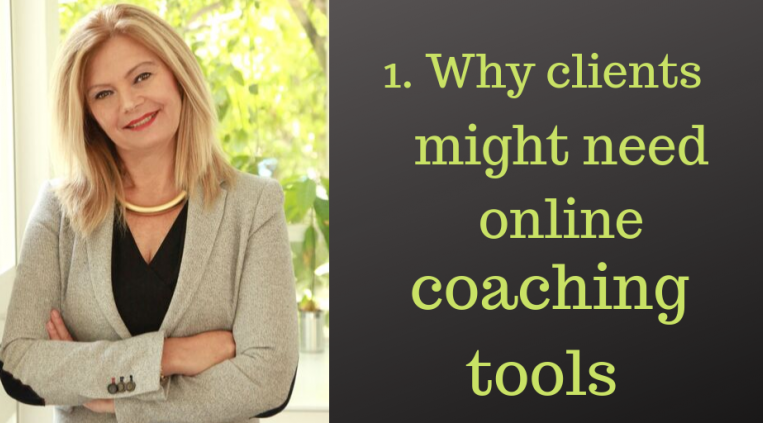
“We’ve got to talk. My career is going down the drain.”
This is how a call began from Jennifer, one of my most successful coaching supervisees. Jennifer is at the top of her field in leadership development with clients from all over the region.
“Of course, Jennifer. Anything you want, you know that,” I responded. “But can you tell me what you mean?”
She explained, “One of my most loyal clients has just cancelled two leadership development seminars for next quarter. Instead, they’re going to have the managers do an online course. My career is doomed and so are my executive coaching rates, Etika. Do you have time to meet me this afternoon?”
Naturally, I obliged and arranged to meet with Jennifer at a coffee shop around the corner from my office.
After a long hug, we sat down and ordered our coffee.
“Etika, what kind of future can I expect if I’m going to be replaced by online courses?” Jennifer asked. “I mean, it’s not enough that there’s so much competition among us coaches, especially with executive coaching rates. Now, we’ve all got online courses to contend with.”
“I hear you, Jennifer, but let’s not forget one of the lessons we learned back in Marketing 101: competition is good. Of course, back in school, we wouldn’t have imagined that a computer would be our competition, but that’s the way things have turned out.”
Jennifer looked at me and said, “Just remind me why competition is good again, Etika.”
“Because it raises awareness of a need. Until recently, career coaching was just for the highly-paid executives who had physical access to a coach. Now, with a variety of technology and platforms, coaching is enjoyed by clients at many more levels of the hierarchy all over the world. Just think how much this has made our profession a real possibility for more people,” I answered.
Jennifer thought for a minute and responded, “But how is this going to help me? Etika, I’ve just had two cancellations. How many others are lurking around the corner?”
“First, Jennifer, if I can suggest, try to stop being afraid of online courses. Just like we tell our clients, change is inevitable. As far as I can see, online courses are going to increase and become an important player in the coaching landscape. It’s time to embrace them, not reject them,” I answered.
“But how can I embrace something that’s eating into my income,” Jennifer asked.
“By finding ways for these online courses to become part of our practice and not in its place. The courses can make us much more professional, as they’ll allow us to offer our clients highly-specialized coaching solutions that were inaccessible in the past. If we do things right, the courses will help us actually increase business,” I responded.
Jennifer started to look interested. “I like what you’re getting at, Etika. Do you have any good ideas to get started?”
I answered, “I have a few brewing and would love to discuss them with you. It’s just that I have another appointment and need to run back to my office.”
Jennifer finally cracked her first smile since we had sat down. We decided to meet two days later, same time, same place. We paid for the coffee and walked out into the sunny afternoon.
In future posts, learn how taking advantage of online tools can help professionalize your coaching practice and help more people.
And always remember:
Great managers are made. Not born.
get your weekly free blog update
COMMENTS
How can executive coaches establish their unique niche?

With so many executive coaches in the market, establishing your own niche is crucial for your practice for two main reasons:
1. It allows you to build your own brand, thus becoming the go-to executive coach for specific issues and paving your corporate development career path.
2. It helps your clients understand exactly what they can expect from working with you, thus increasing chances of success.
In a bid to grow quickly, many coaches end up accepting a wide variety of clients - but with varying degrees of success. How successful you are with specific clients should be a first indication of the types of clients that you should focus on along your corporate development career path. Don’t be a “hit and miss” coach, or at least limit this to your early days of practice.
Instead, you should always have one central question in mind when looking to establish a niche: What are my roots, my beliefs? This will help solidify who you are as a coach and where you are headed.
When I started out as an executive coach, my colleagues in marketing asked me what my strategy was. I gave them a simple response: “to answer questions.” I wasn’t trying to be clever or minimalistic - these were, and still are, the roots of my desire to be an executive coach.
A little bit about my roots. As a kid, I didn’t have it easy - growing up at a time when different learning styles weren’t known about or recognized. As a result, I was labeled as lazy by both my teachers and my parents. I literally struggled all through school and later on in higher education. As a result, my passion has always been to help others avoid the kind of suffering I endured. And this passion was so strong that it naturally led me to my career as an executive coach, where I began helping managers avoid unnecessary suffering on their way up the career ladder.
By identifying with their hardships, I was able to teach them that they have the necessary innate potential to succeed - something that I was forced to teach myself after so many difficult years. So knowing where you’ve come from - what your roots are and how they’ve shaped your beliefs - is essential in establishing your own niche.
I highly recommend that you think deeply about this question yourself. I guarantee you’ll discover the connection between your roots, your beliefs, and who would most benefit from your help as an executive coach. Be sure to review this question periodically, especially in times of difficulty or uncertainty.
Once you are wholeheartedly connected to your roots, maintaining your niche will come naturally. You’ll stay focused on your niche, ignoring the “shiny and new” trends that can sidetrack you towards unproductive directions. Most importantly, you’ll believe in yourself as the best executive coach available for the niche you’ve dedicated yourself to.
And your dedication will pay off. Your clients will know what to expect from you, as who you are, what you offer, and how you offer it will be well-known. This will increase client satisfaction, as you will be delivering exactly what they expect. Client satisfaction will result in valuable referral business. Your clients will be your very own dedicated brand ambassadors, leading to even more growth.
But remember that establishing your own niche isn’t just about your clients. It’s about first looking deep.
And always remember:
Great managers are made. Not born.
get your weekly free blog update
COMMENTS
Should senior level managers consult with leadership coaches?
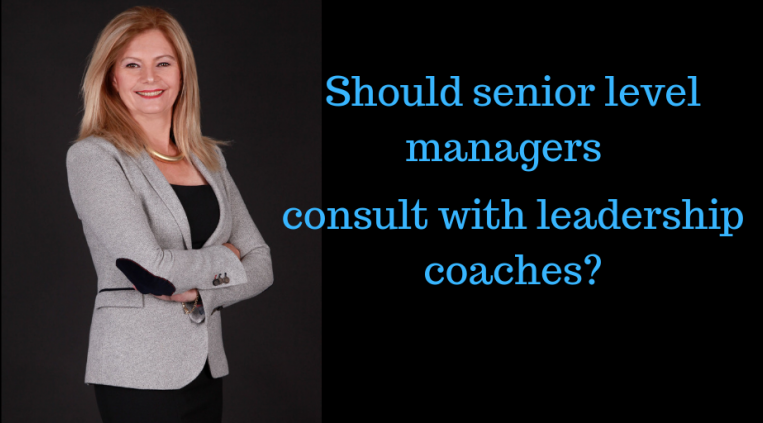
When I welcomed Mark, the CEO of a very successful hi-tech company into my office, I could see that he was less than enthusiastic to see me.
As he sat down, he told me that he had come to me because his good friend Tim, another top hi-tech CEO, had hounded him so much that he finally agreed. I smiled to Mark and told him that Tim had pleaded with me as well to squeeze him in, as Mark was what he described as an urgent case.
But after 35 years of practice, this scenario wasn’t new to me. Most successful CEOs are pretty sure they don’t have much to learn from leadership coaches like me - especially professional development goals for managers.
“Well, Mark, now that we’ve both kept our promises to Tim, we can end things now and part as friends,” I said. I had decided to put the ball in Mark’s court.
Mark was completely taken off guard and even looked embarrassed. We remained silent for a few moments and then he began to speak.
“It’s not just a saying that it’s lonely at the top,” he uttered.
“Everything is great when the company is running well. My employees are keen to share the credit for our successes, and of course, I’m more than happy to do so. But when things go wrong, it gets very cold and lonely,” he admitted.
Mark told me that he had confided in Tim about a week ago, when he’d returned from a board meeting, completely disillusioned. His company had turned out very good quarterly results, yet the board had hoped for larger growth.
Mark had explained that because of recent trade conflicts, it was taking longer than expected to produce certain components in Asia. As a result, there had been a delay in sales.
“But the board wouldn’t accept this explanation,” he upsettingly said.
“They were only interested in seeing a steeper growth graph.”
He continued: “And with all due respect, Etika, I’m really not sure what this has to do with you or how you can help...unless you can recommend some other factories.”
I told Mark that in terms of factories, he’d have to consult with someone else, but regarding his bigger question, every CEO needs and should engage in leadership coaching to promote professional development goals for managers like himself.
“Mark, let me ask you a question. In the last month or so, how many times have you made a tough decision based on your experience, even your gut feelings?” I asked.
Mark gave a wry smile and answered, “Countless times, of course. That’s what’s expected of me - to use both my experience and intuition. That’s why things generally run pretty smoothly.”
“No doubt in my mind, Mark,” I replied. “By the way, do you have any idea what percentage of our decisions comes from habit versus actual processing,” I asked.
Mark shook his head.
“Research shows that about 40% of our daily decisions are automatic, while we only really think through the other 60%,” I said.
“Honestly, I didn’t know that,” Mark replied with interest. “Is this good or bad? Should I be doing something else?” he asked.
“Great question,” I said. “The good part of acting automatically 40% of the time is that it allows us to decide things quickly, thus increasing efficiency and saving us time,” I answered.
“I see,” said Mark.
But then I continued: “The downside is that sometimes we react inappropriately to certain situations we think we’ve seen before.
As experienced managers, we’re expected to think quickly on our feet. This sometimes comes at the expense of taking the time to analyze the situation and think things through.”
“Right, I can relate to that,” Mark admitted. “I’ve shot from the hip a few times - regretting it later.”
“Exactly,” I said with a smile. “Of course, automatic reactions are great for efficiency, but sometimes they need to be restrained. Such restraint allows you to stop and consider if your instincts should be acted upon for a particular situation. This is similar to counting to ten before reacting when you’re angry.”
“I see what you mean,” Mark said.
“And once you do learn to stop and think, you’ll find that you’ll actually develop and add new and improved automatic reactions to your repertoire, rather than sort of recycling yourself” I added.
“Right,” Mark said interestingly.
“As I see things, this is the secret to real growth in managers...the ability to evolve even at the most senior levels,” I commented. “And this is also the place where many CEOs like yourself are lacking, which leads to the “lonely at the top” feeling you mentioned earlier,” I added.
“That makes some sense,” Mark said.
“But you have to want to grow, Mark, and that means regularly meeting with a leadership coach,” I asserted.
Inside, I wasn’t sure whether Mark was convinced. I told him that our time was up and that if he wanted guidance in growing even further, I would be happy to take him on.
Mark was a bit surprised by my abrupt ending, but again, I felt that putting the ball back in his court was the right thing to do.
Based on my experience, CEOs either exhaust themselves out and find another career or carry on trying to grow. It’ll be interesting to see what Mark decides to do.
And always remember:
Great managers are made. Not born..
get your weekly free blog update
COMMENTS
Pages

Get my FREE ebook and never get turned down again !
Popular posts
-
Today, there doesn’t seem to be any aspect of our lives that isn’t...
-
When I welcomed Mark, the CEO of a very successful hi-tech company...
-
Ironically, many C-levels don’t even consider working with...
-
“What’s bothering you, Marlene?”
As I watched...
-
For those of you...
-
What seems to be the dream of every number two in an organization...
-
I believe that coaches can help leaders with an ego by focusing on...
-
I’ve said it before. There’s a chronic illness plaguing our...













COMMENTS